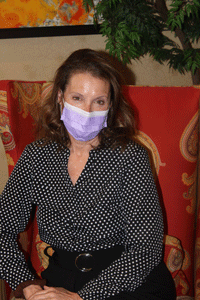Long Island Business News featured an SJC Long Island alumna in a health forum about the COVID-19 pandemic last month.

Kate Schneider ’99
Kate Schneider ’99, who oversees recreation programming for the memory care units at The Bristal Assisted Living facilities, discussed the ways she helps her staff and residents manage their mental health. The Dec. 14 virtual discussion included Regina Barros Rivera, associate executive director of North Shore Child & Guidance Center. It was moderated by LIBN’s Jenna Natale.
“Some things we saw, because of the virus, were that people were unsure of what was happening, things were constantly changing, and we didn’t know what the effects of the virus could be or what works or what doesn’t work in the very beginning,” Schneider said at the forum. “There was constant change, so there was a little bit of frustration because of quarantining. There was loneliness, anxiety. We saw that not only with the residents, but the staff and even the families.
She continued: “We really worked from the beginning to support everybody. And we realized the staff were influencers; we wanted to make sure that they were comfortable, and we can put out that we have calmness … and support for families and residents.”
Getting Creative to Support Mental Health
Schneider said the Bristal Assisted Living facilities used its programming to help support the mental health of its staff and residents during the pandemic. One of her favorite new programs is “Taste of the Season,” created by the dietary team.
“They created these beautiful, healthy smoothies, and we would incorporate it in recreation with the whole building and they just loved that,” explained Schneider, who holds a therapeutic recreation degree from SJC Long Island.
Other departments also pitched in to help programming. Technology helps residents connect with their families through Facebook, FaceTime, and Zoom calls. The “grateful tree” for Thanksgiving garnered a lot of positive messages, despite the troublesome times. The dining room director danced, sang, and passed out gelt for Hanukkah.
Schneider noted that there is a bigger focus on small group planning to comply with social distancing guidelines. These small group activities are productive, according to Schneider, and allowed for the hearing device EverSound to be used — improving the quality of the program.
“We want to have normalcy as much as possible and bring joy to the residents,” Schneider said. “Each department really upped their game and supported the residents and the families.”
Being Mindful of Staff’s Needs
The Bristal Assisted Living facilities needed to keep staffing in-person throughout the pandemic to support residents, increasing the importance of caring for its employees and caring for their mental health. Schneider said the company made sure the staff was comfortable with the policies and procedures in place and that they had the tools needed for a healthy and safe work environment.
“What I heard from the staff was that it brought us closer because we were constantly connecting with each other,” Schneider said. “Being proactive and monitoring that communication and getting strong with that made us excellent at what we did.”
During the forum, Schneider said her company was proactive with caring for the staff’s mental wellbeing: they already had an employee assistance program in place, there was a support hotline for staff, and there is an open-door policy where staff can talk to their director or human resources.
“I know there’s so much negativity, but we really tried to accentuate the good that can come out of this,” Schneider said. “We saw staff members come up to each other and do that distant high five, smile, and say ‘thank you’ to each other. Everyone who I’ve spoken to in our communities, what they keep saying to me is that we’ve become closer, stronger, and more appreciative toward each other.”

